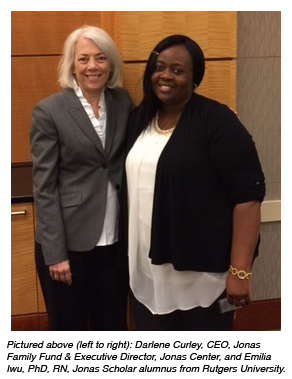Darlene Curley and Jonas Scholar Alumuns Participate in National Academy of Sciences: Global Forum on Innovation in Health Professional Education
April 20 – 23, 2016: Darlene Curley, CEO, Jonas Family Fund and Executive Director, Jonas Center for Nursing and Veterans Healthcare, and Emilia Iwu, PhD, RN, Jonas Scholar alumnus from Rutgers University, participated in a three-day conference organized by the Global Forum on Innovation in Health Professional Education (IHPE). Since 2012, this forum of diverse, multi-national, professional academic stakeholders meets twice yearly to review issues related to health professional education and proffer strategies to ensure the health professions remain responsive to global workforce needs. More information about the forum activities and reports is available at: www.nationalacademies.org/hmd/Activities/Global/InnovationHealthProfEducation.aspx.
 This workshop, held at the Keck Center in Washington, DC, examined the “Role of Accreditation in Enhancing Quality and Innovation in Health Professions Education.” On day one, attendees reviewed the impact of IHPE activities and worked on strategic planning and priorities for the year. Following opening remarks by co-Chairs Malcom Cox, MD and Susan Scrimshaw, PhD, Dr. Garth Graham of Aetna Foundation presented on “Looking at the Big Picture: Grant-making Strategies to Improve the Health of People from Underserved Communities.” Dr. Graham challenged forum members to think outside the box and “ensure that students understand the history related to the Social Determinants of Health (SDH).” He highlighted health disparities related to life span and health outcomes, and showed a historic trajectory of previous policy efforts to eliminate health disparities in the U.S. including attempts to reform healthcare. He reminded participants that successful interventions must include consumer perspectives on what constitutes “quality,” as well as population health and broad wellness lenses that “focus” beyond clinical thinking.
This workshop, held at the Keck Center in Washington, DC, examined the “Role of Accreditation in Enhancing Quality and Innovation in Health Professions Education.” On day one, attendees reviewed the impact of IHPE activities and worked on strategic planning and priorities for the year. Following opening remarks by co-Chairs Malcom Cox, MD and Susan Scrimshaw, PhD, Dr. Garth Graham of Aetna Foundation presented on “Looking at the Big Picture: Grant-making Strategies to Improve the Health of People from Underserved Communities.” Dr. Graham challenged forum members to think outside the box and “ensure that students understand the history related to the Social Determinants of Health (SDH).” He highlighted health disparities related to life span and health outcomes, and showed a historic trajectory of previous policy efforts to eliminate health disparities in the U.S. including attempts to reform healthcare. He reminded participants that successful interventions must include consumer perspectives on what constitutes “quality,” as well as population health and broad wellness lenses that “focus” beyond clinical thinking.
An overview of forum recommendations related to the “Framework for Educating Health Professionals to address SDH” was presented (see http://www.nap.edu/catalog/21923/a-framework-for-educating-health-professionals-to-address-the-social-determinants-of-health). The Academy Research Center presentation on impact of IHPE reports revealed that IHPE workshop summaries and reports were downloaded in 109 countries in 2015. A total of 36,345 downloads were outside of the U.S. Participants worked on a 2016 strategic plan during break-out sessions. The day concluded with Susan Scrimshaw’s review of the common feature for education reform.
The accreditation workshop began on the second day, with representatives from all health professional licensing and accreditation agencies, funders and other stakeholders. Susan D. Phillips, PhD (Chair, National Advisory Committee on Institutional Quality & Integrity) presented the “Realities, Challenges and Opportunities” of accreditation. She highlighted the fact that accreditation ensures standardization, quality and confers academic legitimacy for institutions. However, it can hinder professional advancement when misaligned with progressive and futuristic professional changes. Discussion and debates explored the tradeoffs and professional drivers of accreditation. A webcast session examined issues related to social accountability in terms of global and community involvement, especially the role of accreditation in program recognition and the need to contextualize accreditation to enhance service to the communities of practice. In breakout sessions, participants focused on ways to foster accreditation through collaboration, such as: harmonization of competency-based standards across professions; bringing education and practice accreditors together; balancing global standards with local context; and improving efficiencies through collaboration.
The final day of the conference was used to reflect on and discuss the role of “persons served,” in other words incorporating patients, families, communities and/or populations in health professional education accreditation. “One Health Accreditation across Nations” was presented as a model and case study. Representatives from National League for Nursing, Association of Schools of Allied Health Professions and Accreditation Council for Pharmacy Education spoke about cross-cutting competencies and the drivers for change (e.g. health care financing and the need to eliminate professional silos), and the need to address both education as well as practice. David Benton, CEO of the National Council of State Boards of Nursing, reiterated the importance of context, timing, aligning processes to benefit everyone, and capturing data once that can be used for multiple purposes. The workshop concluded with discussions about next steps, especially involving other non-health-related stakeholders, and acting quickly with the collective leadership of current members in order to achieve much-needed change.